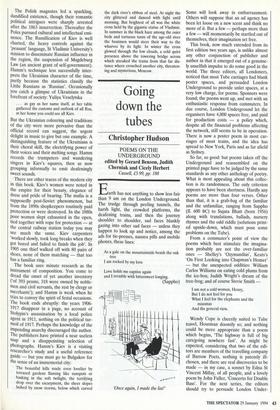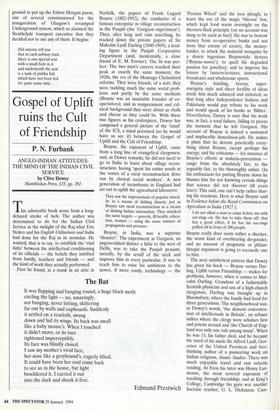Going down the tubes
Christopher Hudson
POEMS ON THE UNDERGROUND edited by Gerard Benson, Judith Cherniak and Cicely Herbert Cassell, £5.99, pp. 188 Earth has not anything to show less fair than 9 am on the London Underground. The trudge through peeling tunnels, . the harsh light, the crowded platforms, the deafening trains, and then the journey shoulder to shoulder, sad faces blankly gazing into other sad faces — unless they happen to look up and notice, among the ads for tie-presses, nausea pills and mobile phones, these lines:
As a gale on the mountainside bends the oak tree I am rocked by my love Love holds me captive again and I tremble with bittersweet longing.
(Sappho) `Once again, I made the list!' Some will look away in embarrassment. Others will suppose that an ad agency has been let loose on a new scent and think no more of it. But a few — perhaps more than a few — will momentarily be startled out of themselves, their imagination set free.
This book, now much extended from its first edition two years ago, is unlike almost any other conjunction of publisher and author in that it emerged out of a genuine- ly unselfish impulse to do some good in the world. The three editors, all Londoners, noticed that most Tube carriages had blank poster spaces, and persuaded London Underground to provide unlet spaces, at a very low charge, for poems. Sponsors were found; the poems went up, and met with an enthusiastic response from commuters. In due course, London Underground let the organisers have 4,000 spaces free, and paid for production costs — a policy which, despite all the financial problems affecting the network, still seems to be in operation. There is now a poster poem in most car- riages of most trains, and the idea has spread to New York, Paris and as far afield as Sydney.
So far, so good: but poems taken off the Underground and reassembled on the printed page have to be judged by the same standards as any other anthology of poetry. What is most appealing about this collec- tion is its randomness. The only criterion appears to have been shortness. Hardly any poems are more than four verses. Other than that, it is a grab-bag of the familiar and the unfamiliar, ranging from Sappho (fl. 600 BC) to Sujata Bhatt (born 1956) along with translations, ballads, nursery rhymes and the odd riddle (solutions print- ed upside-down, which must pose some problems on the Tube).
From a commuter's point of view the poems which best stimulate the imagina- tion probably are not the over-familiar ones — Shelley's `Ozymandias', Keats's 'On First Looking into Chapman's Homer' — but the unexpected oddities: William Carlos Williams on eating cold plums from the ice-box; Judith Wright's dream of the tree-frog; and of course Stevie Smith - I am not a cold woman, Henry,
But I do not feel for you What I feel for the elephants and the miasmas And the general view.
Wendy Cope is cheerily suited to Tube travel, Housman doomily so; and nothing could be more appropriate than a poem which begins, The highway is full of big cars/going nowhere fast'. As might be expected, considering that two of the edi- tors are members of the travelling company of Barrow Poets, nothing is patently ill- chosen, and there are real discoveries to be made — in my case, a sonnet by Edna St Vincent Millay, of all people, and a lovely poem by John Fuller, 'Concerto for Double Bass'. For the next series, the editors should try to persuade London Under- ground to put up the Edwin Morgan poem, one of several commissioned for the inauguration of Glasgow's revamped Underground system, which so alarmed the Strathclyde transport executive that they decided not to use any of them. It begins:
Did anyone tell you that in each subway train there is one special seat with a small hole in it and underneath the seat is a tank of pirhha fish which have not been fed for quite some time . . .



































































 Previous page
Previous page